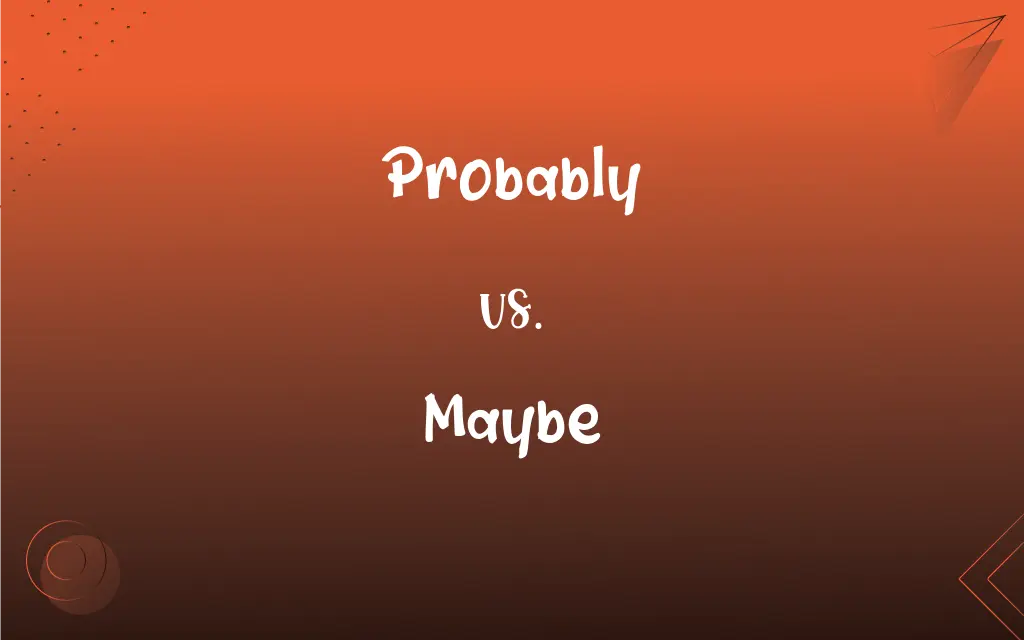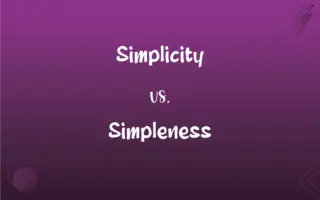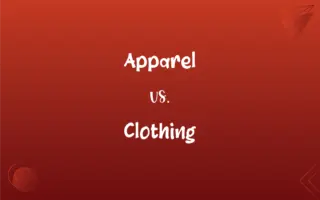Probably vs. Maybe: What's the Difference?
Edited by Aimie Carlson || By Janet White || Updated on November 13, 2023
Probably suggests a high likelihood or probability of an event. Maybe indicates uncertainty or possibility, without a strong inclination towards likelihood.

Key Differences
"Probably" implies a greater likelihood or chance of an event occurring, suggesting that the speaker believes the event is more likely to happen than not. "Maybe", in contrast, is more neutral, indicating that an event may or may not happen without leaning towards either probability.
In usage, "probably" is often chosen when the speaker wants to convey confidence or a reasoned guess, whereas "maybe" is used when the speaker wishes to remain non-committal or uncertain.
Context can affect the interpretation of these words. "Probably" can sometimes be used ironically or doubtfully, while "maybe" can be used to politely decline or defer a decision.
"Probably" often carries a sense of expectation or anticipation, whereas "maybe" is more closely associated with hesitation or tentativeness.
The choice between "probably" and "maybe" can also be influenced by cultural or personal communication styles, with some individuals or cultures preferring more or less definitive language.
ADVERTISEMENT
Comparison Chart
Degree of Certainty
Indicates a higher degree of certainty.
Implies less certainty, more neutrality.
Usage Context
Often used for reasoned guesses or confidence.
Commonly used for non-commitment or uncertainty.
Tone
Can suggest expectation or anticipation.
Often conveys hesitation or tentativeness.
Variability
Sometimes used ironically or doubtfully.
Can be used politely to defer a decision.
Cultural Influence
May reflect a preference for definitive language.
May indicate a more cautious or balanced approach.
ADVERTISEMENT
Probably and Maybe Definitions
Probably
Used to express a belief that something is likely.
She is probably the best in her class.
Maybe
Expresses uncertainty or possibility.
Maybe I'll go to the party.
Probably
Used to suggest that something is the case as far as one knows.
They are probably out for dinner.
Maybe
Implies a tentative or undecided state.
I'm not sure, maybe.
Probably
Signifies a strong likelihood of occurrence.
It will probably rain tomorrow.
Maybe
Used to express a lack of commitment to a definite answer.
Maybe we can talk about this later.
Probably
Implies a high degree of probability but not certainty.
It's probably too late to call her now.
Maybe
Used to indicate that something is possible.
Maybe it will stop raining soon.
Probably
Indicates something is more likely than not.
He'll probably be late again.
Maybe
Suggests something that might happen or be true.
Maybe he forgot our appointment.
Probably
Most likely; presumably.
Maybe
Used to indicate uncertainty or possibility
We should maybe take a different route. Maybe it won't rain.
Probably
In all likelihood.
Maybe
An uncertainty
There are so many maybes involved in playing the stock market.
Probably
In a probable manner; in likelihood.
Distinguish between what may possibly and what will probably be done.
Maybe
An uncertain reply
It's better to receive a fast and honest no than a drawn-out maybe.
Probably
With considerable certainty; without much doubt;
He is probably out of the country
In all likelihood we are headed for war
Maybe
Modifies a verb, indicating a lack of certainty: it may be (that)...
Maybe I was imagining it, but I could swear that the dog understood what I was saying.
Probably
Easy to believe on the basis of available evidence;
He talked plausibly before the committee
He will probably win the election
Maybe
Perhaps that is true expressing no commitment to a decision or a neutral viewpoint to a statement.
Maybe
Certainly.
Maybe not the best idea.
Maybe
Possible; uncertain.
Maybe
(informal) Something that is possibly true.
Maybe
(informal) An answer that shows neither agreement nor disagreement.
The results of the poll were inconclusive. We got two yeses, three nos, and four maybes.
Maybe
(informal) A future event that may or may not happen.
About your raise: it's a big maybe.
Maybe
Perhaps; possibly; peradventure.
Maybe the amorous count solicits her.
In a liberal and, maybe, somewhat reckless way.
Maybe
Possible; probable, but not sure.
Then add those maybe years thou hast to live.
Maybe
Possibility; uncertainty.
What they offer is mere maybe and shift.
Maybe
By chance;
Perhaps she will call tomorrow
We may possibly run into them at the concert
It may peradventure be thought that there never was such a time
FAQs
Is "maybe" a polite way to decline?
Yes, it can be used to politely decline or defer a decision.
Can "maybe" be used to give a tentative yes?
Yes, "maybe" can imply a non-committal or tentative agreement.
Does "probably" imply certainty?
No, it implies high likelihood but not absolute certainty.
Does "maybe" have different meanings in different cultures?
Yes, cultural nuances can affect its interpretation.
Can "probably" be used in formal writing?
Yes, though it may depend on the level of formality and certainty required.
Can "probably" be replaced with "likely"?
Often yes, as both suggest a high probability.
Can "probably" indicate a guess?
Yes, it can be used to indicate an educated guess.
Is "probably" more certain than "maybe"?
Yes, "probably" suggests a higher likelihood than "maybe."
Is "maybe" always non-committal?
Generally yes, but it can also express possibility or potential.
Can context change the meaning of "probably"?
Yes, context and tone can sometimes give it an ironic or doubtful meaning.
Is "maybe" appropriate in academic writing?
It's less common in academic writing due to its tentative nature.
Does "maybe" imply indifference?
Not necessarily, but it can suggest a lack of strong opinion.
Is "maybe" less assertive than "probably"?
Yes, it's generally seen as less assertive and more tentative.
Does "probably" carry a positive connotation?
It can, especially when suggesting a good outcome is likely.
Is "probably" used in predictions?
Yes, it's often used when predicting likely outcomes.
Can "probably" be used to hedge a statement?
Yes, it's often used to soften the certainty of a statement.
Can "maybe" be seen as evasive?
Sometimes, especially if used to avoid a direct answer.
Can "probably" be offensive if used sarcastically?
Yes, if the sarcasm implies doubt or disbelief.
Is "maybe" suitable for making decisions?
It can be, but it often indicates that the decision is not final.
Does "maybe" reflect uncertainty or flexibility?
It can reflect both, depending on context and tone.
About Author
Written by
Janet WhiteJanet White has been an esteemed writer and blogger for Difference Wiki. Holding a Master's degree in Science and Medical Journalism from the prestigious Boston University, she has consistently demonstrated her expertise and passion for her field. When she's not immersed in her work, Janet relishes her time exercising, delving into a good book, and cherishing moments with friends and family.
Edited by
Aimie CarlsonAimie Carlson, holding a master's degree in English literature, is a fervent English language enthusiast. She lends her writing talents to Difference Wiki, a prominent website that specializes in comparisons, offering readers insightful analyses that both captivate and inform.































































